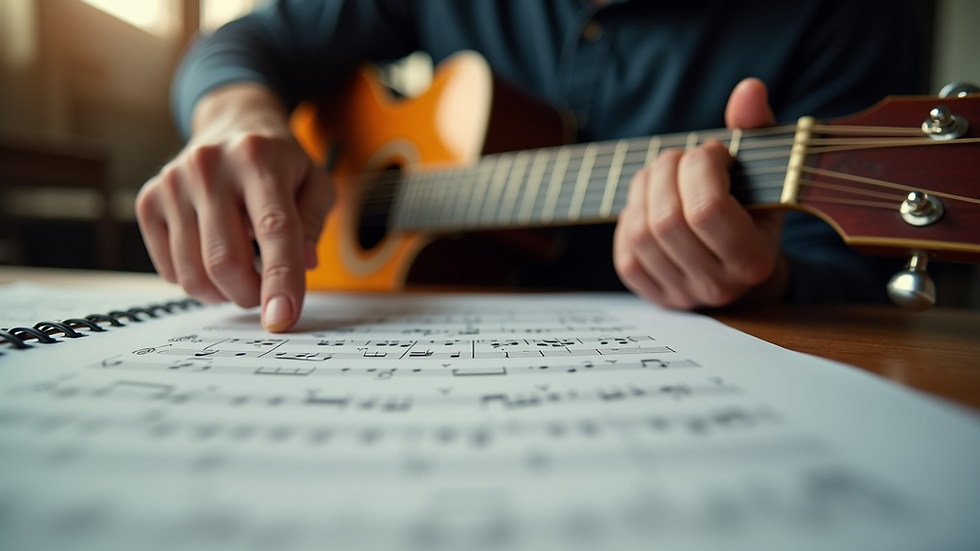Mastering the Trinity Guitar Exam
- Simon

- Sep 5
- 4 min read
If you’ve ever thought about taking a guitar exam, you’re in the right place. Preparing for the Trinity guitar exam can feel like a big mountain to climb, but with the right approach, it’s absolutely doable - and even enjoyable! Whether you’re just starting out or looking to polish your skills, this guide will walk you through everything you need to know to master your guitar exam preparation.
Let’s dive in and make sure you’re ready to impress your examiner and, most importantly, have fun along the way.
Getting Started with Guitar Exam Preparation
When it comes to guitar exam preparation, the first step is understanding what the exam actually involves. Trinity’s guitar exams are designed to test your playing skills, musical knowledge, and performance ability in a structured yet encouraging way. The exam usually includes:
Performance pieces: You’ll play a selection of pieces from different styles and difficulty levels.
Technical work: Scales, arpeggios, and exercises to show your control and technique.
Sight-reading: Playing a piece you’ve never seen before to test your reading skills.
Aural tests: Listening exercises to assess your musical ear.
Knowing this breakdown helps you focus your practice sessions effectively. For example, if sight-reading feels tricky, dedicate a few minutes each day to reading new music. If your technique needs work, spend time on scales and finger exercises.
One of the best ways to prepare is to set a practice schedule that balances all these areas. Here’s a simple weekly plan you might try:
Monday & Wednesday: Focus on performance pieces.
Tuesday & Thursday: Work on technical exercises.
Friday: Practice sight-reading and aural tests.
Weekend: Play through everything and record yourself.
Recording your practice sessions is a game-changer. It helps you hear mistakes you might miss while playing and track your progress over time.

Tips and Tricks for Effective Guitar Exam Preparation
Now that you know what to expect, let’s talk about how to prepare smartly. Here are some practical tips that have helped many guitarists succeed:
Break it down: Don’t try to learn a whole piece in one go. Divide it into sections and master each part before moving on.
Use a metronome: Timing is crucial. Practising with a metronome will improve your rhythm and help you play steadily.
Stay relaxed: Tension in your hands or shoulders can affect your playing. Take breaks and stretch regularly.
Visualise your exam: Imagine yourself playing confidently in front of the examiner. This mental rehearsal can reduce nerves.
Get feedback: Play for friends, family, or your teacher. Constructive criticism is invaluable.
Remember, the goal is progress, not perfection. Every small improvement counts and builds your confidence.
If you want to explore more about the exam structure and get tailored advice, check out this Trinity music exams resource. It’s packed with useful info and examples.

How much does a Trinity music exam cost?
One question that often pops up is: How much does a Trinity music exam cost? The answer varies depending on your location, the grade you’re taking, and the exam centre. Generally, the fees cover the examiner’s visit, administration, and certification.
To give you a rough idea:
Initial grades (1-3) tend to be more affordable, often around £30-£50.
Intermediate grades (4-6) might range from £50-£80.
Advanced grades (7-8) can cost upwards of £80-£100.
Additional costs might include:
Entry fees for the exam.
Materials like books or sheet music.
Tuition if you’re taking lessons to prepare.
It’s a good idea to budget for these expenses early on. Some schools or exam centres offer discounts or group rates, so it’s worth asking.
If you’re planning to take your exam through an online school like Tremolo Guitar School, they often provide clear pricing and package deals that include lessons and exam entry, making the process smoother and more affordable.
Building Confidence for Your Guitar Exam Day
Nerves are natural, but they don’t have to hold you back. Building confidence is just as important as practising your pieces. Here’s how to get into the right mindset:
Simulate the exam environment: Play your pieces in front of family or friends as if they were examiners.
Prepare your gear: Make sure your guitar is in good condition, and bring everything you need on the day.
Arrive early: Give yourself plenty of time to settle in and warm up.
Focus on the music, not the score: Remember, the examiner wants to see your musicality and enjoyment, not just technical perfection.
Breathe and smile: Deep breaths help calm nerves, and a smile can boost your mood and presence.
Confidence grows with experience, so the more you perform, the easier it gets. Think of your exam as a celebration of all the hard work you’ve put in.

What Comes After Your Trinity Guitar Exam?
Once you’ve taken your exam, it’s time to reflect and plan your next steps. Passing your Trinity guitar exam is a fantastic achievement, but it’s also just one milestone on your musical journey.
Here’s what you can do next:
Review your feedback: Examiners provide comments that can guide your future practice.
Set new goals: Whether it’s moving up a grade, learning new styles, or composing your own music, keep challenging yourself.
Explore performance opportunities: Join local bands, open mic nights, or online communities to keep playing regularly.
Consider teaching: Sharing your skills with others can deepen your understanding and passion.
Keep learning: Online courses, workshops, and private lessons can help you grow.
Remember, music is a lifelong adventure. Each exam is a stepping stone, not the finish line.
Mastering the Trinity guitar exam is within your reach. With consistent practice, smart preparation, and a positive mindset, you’ll not only pass your exam but also become a more confident and expressive guitarist. So pick up your guitar, start practising, and enjoy every moment of your musical journey!
Happy playing!




Comments